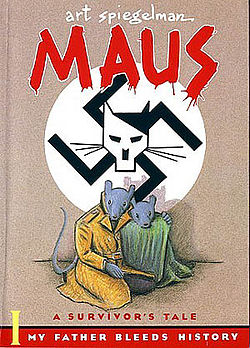In a post a while back I claimed that Maus was glib. Charles Hatfield refutes me thus:
Noah, ach, this is more of your tendentious, hammer-blunt, idol-toppling perversity at work.
Your method, from my POV, is to work by comparison/contrast to things you esteem, find fault on the basis of those personal points of reference (as in, Spiegelman isn’t Celan), then point out that, besides the much-idolized comic in question, lots of other artists, in other media, other forms, have engaged in the same things — in this case, self-reflexive and metanarrative feints — so that these are, ho hum, hardly new (even though Spiegelman’s way of doing them was decidedly new to comics). Then you elevate the comic’s use of such common devices to a moral failing, as in, Spiegelman is glib. Then, when confronted, you persist in dissing the comic in question as, here you go again, “tiresome,” old hat, and inferior to works in wholly other forms, works whose agendas and burdens and formal affordances are light years away from the comic in question.
FWIW, you’re entirely wrong about Maus being merely glib. This was the tack I took as a reader initially, back in the mid-80s, due to my own initial resistance to work that exploded or ignored the boundaries of comic book culture as I, an ardent fan, understood it. But when I finally read, years later, the completed Maus, I realized that this was a moving, indeed for me deeply affecting, work that used intellectualized conceits and circuitous method to earn, and make the reader earn, a stunning emotional effect. Maus moves many people for a reason, something your dismissive posturing cannot account for.
In hindsight, there’s nothing glib about Maus at all, and you’re condemning it (condemning is not too strong a word) precisely for its use of the comical, its word/image tensions, its aesthetic effects. You’re condemning it for not rising to the ontological heights, or depths, of Celan, for being something other than what your straw argument insists that it must be. You’re faulting its medium-specific complexities as simplicities. In essence, you’re adding your voice to the chorus of shallow ad hominem criticisms based on a dislike of Spiegelman’s persona, the kind of obtuse, tone-deaf criticism seen in, for example, Harvey’s willful misreading of the book in his The Art of the Comic Book.
Spiegelman will always be subject to arguments that he is “glib.” His refusal to tack away from the comical, his refusal to deliver what others expect of a Holocaust account, and his deeply fraught portrayal of his father are bound to rub a few readers raw. But the charge is itself glib, unearned.
Note that Spiegelman never affirms that his portrayal is “real” in any straightforward, uncomplicated sense. Not even his words do this. Attention to the text, the whole text, verbal and visual, reveals that, as Vol. 2 speeds to its end, Maus unpacks layer after layer of hopeful artifice, and ends on a deliberately deceptive note, whereby father and son together fantastically reconstruct the absent mother who, we know full well from earlier chapters, cannot be restored, indeed is the irrevocable and constitutive absence, or loss, around which the book is built. You haven’t even begun to plumb the depths of this layering.
Again, from my POV your considerable writerly gifts are being sabotaged by your crushingly obvious yen for idol-toppling. The way you swing that truncheon of ideological criticism, in predictable and predictably unsympathetic ways, is a stone cold drag. You’d give us much more if you stopped trying to enrage fans and instead applied your needle-sharp intelligence to actually reading the comics with due attention, without trying to make the alleged limitations of the comics into a warrant for swinging that stick.


So, Noah, hum… did you reread Maus with due attention to change your mind about it?
Heh. I have not reread Maus recently, I have to admit. I don’t like it much, so there’s not a lot of incentive, unfortunately….
I respect you both, but I side with Charles on this one.
I like Maus, I was just teasing Noah.
On the other hand Charles’ comment above is too tinted with fannish defensiveness for my taste.
To be fair, my post about Maus (which Charles is responding to) was pretty harsh.